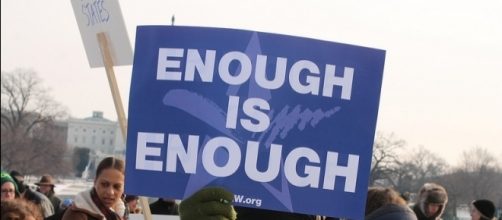Advocating for Gun Control reform after the Las Vegas mass shooting, and mass shootings, in general, may be the most ineffective way to begin a discussion on legislating gun ownership. This is not because it is wrong to politicize tragedies. I would argue, on the contrary, politics is the mechanism for which we achieve change. Politicizing a tragedy may be the best way to honor the victims as it acknowledges the circumstances surrounding their deaths, and attempts to open a dialogue that could find and fix the problems that may have led to such tragedies.
Arguably, politicizing tragedies is the only proper way to mourn the deaths of victims of mass shootings and other tragedies as it keeps their memories alive as we search for solutions to issues plaguing our society. There are other main reasons: mass shootings are terrible indicators of problems with gun control laws and passions run too deep directly after a publicized tragedy.
Mass shootings as indicators
While mass shootings may reveal previously unknown or overlooked loopholes, many of the gunmen get their firearms through the same process we have laid out to prevent such tragedies. Of course, the argument is we should amend this process so that people who would commit such heinous acts could not get weapons and these tragedies serve to highlight the problem with “gun culture” in America; and while that argument is well-intentioned, only discussing it after a mass shooting is a misguided approach.
The truth is these tragedies only represent a minute proportion of Gun Violence in the United States. In fact, according to a data chart published by Mother Jones detailing mass shootings in the US since 2001, there have been a total of 34 mass shootings between 2001 and 2013 which accounted for approximately 300 of the 406,496 deaths due to gun violence in that period. Due to mass shootings accounting for such a high number of overall deaths, starting the discussion only after these events may only serve to diminish the gun control argument by focusing on a specific area of the issue that is statistically in the minority.
Passions run deep after mass shootings
The second major issue with advocating for gun control directly after a major tragedy is that due to the publicity that immediately follows such events both sides of the partisan divide immediately become entrenched to prepare for the coming political battle over gun control legislation.
We see evidence of this now following the mass shooting in Las Vegas with Jimmy Kimmel’s tearful monologue along with other Democratic representatives calling for immediate gun control reform, and the subsequent backlash from the Conservative side such as pundits like Ben Shapiro (his remarks can be seen in the video below) and many other Conservative pundits, and Republican lawmakers.
We also see it in the sales of guns as they tend to go up in the aftermath of a mass shooting both out of fear of increased crime and fear of the what the future of gun ownership in America may be. An example of this can be seen in a recent report by Hayley Miller of Huffington Post, in which she reports on the rise of bump stocks (which the shooter in the Las Vegas mass shooting used on his weapons).
In the aftermath of highly publicized mass shootings, feelings tend to trump facts, and both sides tend to use fear to attempt to shut down the debate as quickly as possible (Democrats use the fear of guns to push what is basically “no debate gun control” and their Republican counterparts tend to use the fear of extreme gun control to argue against debate). The truth is gun control debate should be a prolonged dialogue in which we actively listen to the opinions and concerns of each other. We should attempt to pass reform that not only protects the rights of those who want firearms but also protects citizens from the danger that are inherited with firearms. However, the political and social climate created directly after mass shootings simply does not lend itself to this type of debate.


